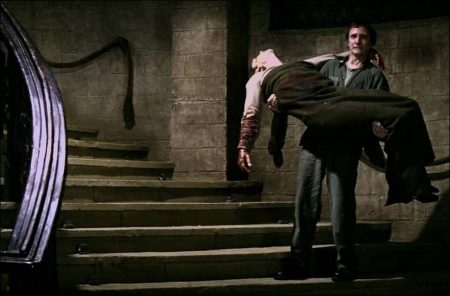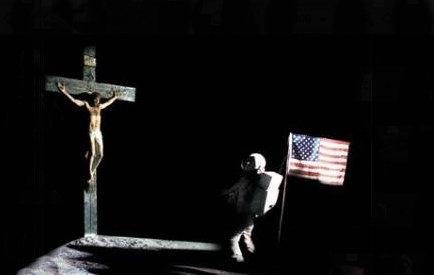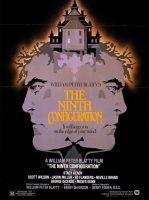Taglines: Madness is a soldier’s final retreat.
The Ninth Configuration movie storyline. Sent to a converted castle in the Pacific Northwest used by the U.S. government as a psychiatric institution for military personnel who fought in the Vietnam War, the unorthodox psychiatrist, Colonel Kane, has a lot on his plate already, trying to figure out whether the inmates feign insanity or not. Still struggling with his inner demons, Kane is particularly intrigued by the psychotic former astronaut, Captain Cutshaw, whose metaphysical enquiries trigger a feverish recurring nightmare.
More and more, as Kane and Cutshaw engage in intense theological debates over the existence of God and evil, the troubled scientist finds himself at a dead-end, in need of a brilliant but reckless plan to determine the root of the soldiers’ complex mental breakdowns. Can Colonel Kane provide proof of an afterlife?
The Ninth Configuration (also known as Twinkle, Twinkle, “Killer” Kane) is a 1980 American psychological drama film[2] written, produced and directed by William Peter Blatty, in his directorial debut. It is based on Blatty’s novel The Ninth Configuration (1978), which was itself a reworking of an earlier version of the novel, first published as Twinkle, Twinkle, “Killer” Kane! in 1966. The initial 1966 publication of the novel featured an exclamation mark at the end of the title, while all subsequent publications saw it removed.
The first half of the film has the predominant tone and style of a comic farce. In the second half, the film becomes darker as it delves deeper into its central issues of human suffering, sacrifice and faith. The film also frequently blurs the line between the sane and insane. The film was recognized with the Golden Globe Award for Best Screenplay and two other nominations at the 38th Golden Globe Awards.
About the Story
Sometime in the early 1970s, “toward the end of the War in Vietnam” as stated in the opening narration, a large castle is used by the US government as an insane asylum for military personnel. Among the many patients there is a former astronaut, Billy Cutshaw (Scott Wilson), who aborted a moon launch and was dragged screaming from the capsule, suffering from an apparent mental breakdown.
Colonel Kane (Stacy Keach), a former member of a United States Marine Corps special unit, arrives at the castle to take over the treatment of the patients. He meets Colonel Fell (Ed Flanders), who helps Kane acclimate himself to the eccentricities of the patients. Kane pays special attention to Cutshaw, repeatedly asking him why he did not want to go to the moon. Cutshaw refuses to answer but instead gives him a St. Christopher medal. Later, Cutshaw talks with Reno about Kane. Reno suspects that Kane is crazy himself. He asserts that psychiatrists often go crazy and have the highest suicide rate of any profession.
Kane falls asleep in his office and has a nightmare. When recounting it, he explains to Fell that they are the nightmares of his brother Vincent, a former patient and murderer who is now dead. Cutshaw talks with Kane again, and they debate God and the idea that there is a divine plan. Kane, who believes that the existence of a God is far more likely than humanity’s having emerged from “random chance”, argues that deeds of pure self-sacrifice are proof of human goodness, which can only be explained by divine purpose.
Cutshaw demands that Kane recall one concrete example of pure self-sacrifice from his personal experience; Kane is unable. Kane takes Cutshaw to a church service, which Cutshaw interrupts with several outbursts, and Kane momentarily hallucinates. After returning to the castle, Cutshaw thanks Kane and asks him to send him a sign as proof of an afterlife should Kane die first. Kane promises to try.
When Kane meets with a new patient, the patient calls him “Killer Kane”, and Kane flashes back to Vietnam, where he has decapitated a young boy. The soldier urges Kane to leave, and he screams. In the present, Kane collapses, unconscious. Fell explains to the staff that Kane is Vincent “Killer” Kane and suffered a breakdown in Vietnam. When Fell, who is Kane’s brother Hudson, was dispatched back to America, Kane received the dispatch by accident.
Kane created a new persona for himself – a healer, like his brother. Subconsciously hoping to heal people to make up for his “murders”, Kane returned to the US as his brother. Realizing Kane’s mental state, the Army psychiatric staff maintained the charade and sent him to Fell’s hospital under the pretext of being its commanding officer. In reality, Fell has been the commanding officer all along. Kane awakens and remembers nothing of the incident.
Cutshaw escapes the castle and visits a bar. A biker gang recognizes Cutshaw from news reports and brutalize him. A waitress (Linda Tuero, who was married to Blatty at the time) contacts the hospital, and Kane arrives to retrieve him. Kane humbles himself to the bikers to extricate Cutshaw, but the bikers are disgusted by his behavior. The gang attempt to rape Cutshaw, causing Kane to snap and kill most of the bikers with his bare hands.
Kane and Cutshaw return to the castle, and the police arrive to arrest Kane for the murders at the bar. Colonel Fell interjects and tells the policemen that Kane must stay since he was provoked. Cutshaw visits Kane, who has wrapped himself in a blanket. Dreamy and distant, Kane disjointedly mumbles to Cutshaw about God and proof of human goodness before passing out. As Cutshaw leaves, Kane’s hand emerges from his blankets and drops a bloodied knife. Outside Kane’s room, Cutshaw notices a spot of blood on his shoe. Rushing back in, Cutshaw discovers that Kane committed suicide to provide proof of human goodness.
The Ninth Configuration (1980)
Directed by: William Peter Blatty
Starring: Stacy Keach, Scott Wilson, Jason Miller, Ed Flanders, Neville Brand, George DiCenzo, Moses Gunn, Robert Loggia, Joe Spinell, Alejandro Rey, Tom Atkins, Steve Sandor
Screenplay by: William Peter Blatty
Production Design by: Bill Malley
Cinematography by: Gerry Fisher
Film Editing by: Battle Davis, Tony de Zarraga, Peter Lee-Thompson, Roberto Silvi
Costume Design by: Tom Bronson
Set Decoration by: Sydney Ann Smith-Kee
Art Direction by: J. Dennis Washington
Music by: Barry De Vorzon
MPAA Rating: None.
Distributed by: Warner Bros. Pictures
Release Date: February 29, 1980
Views: 269


